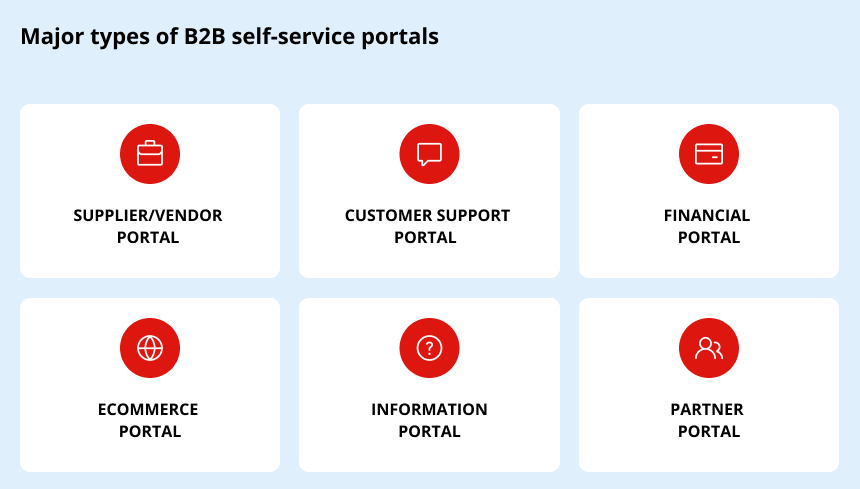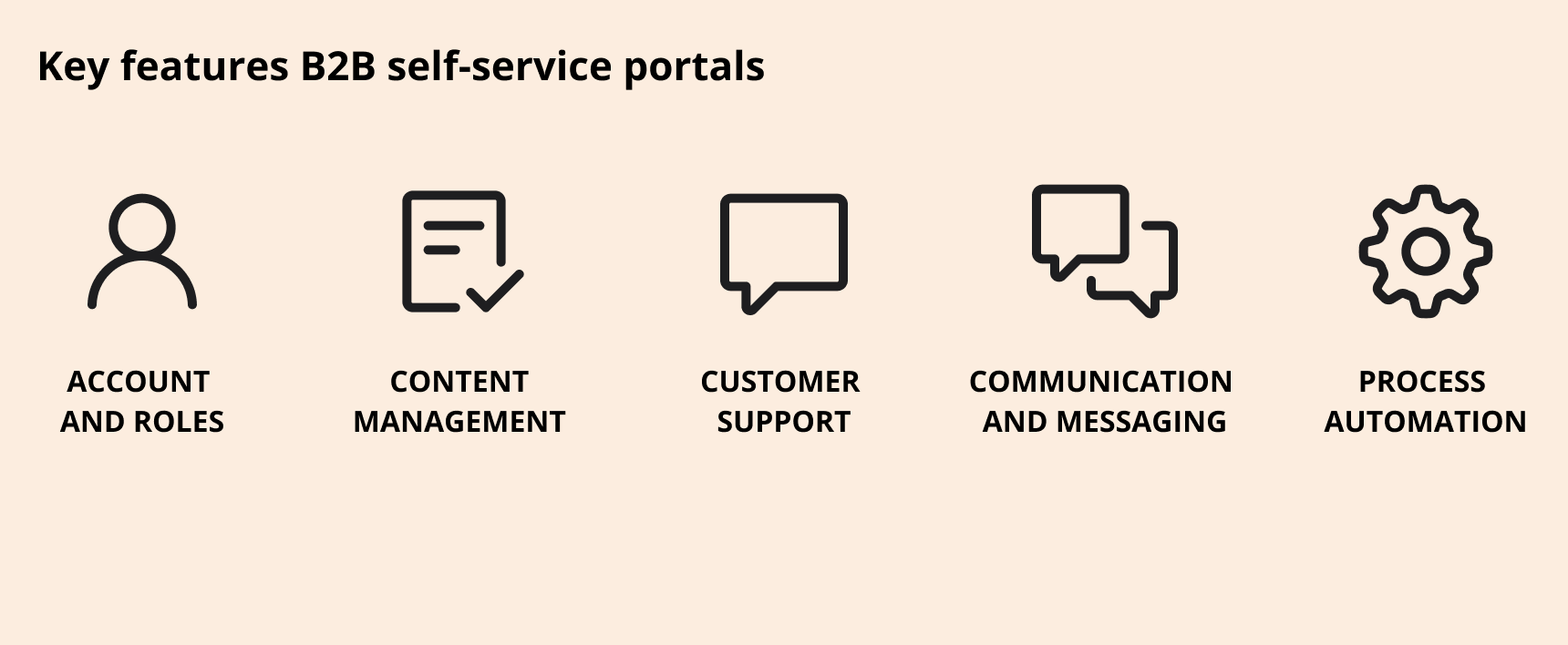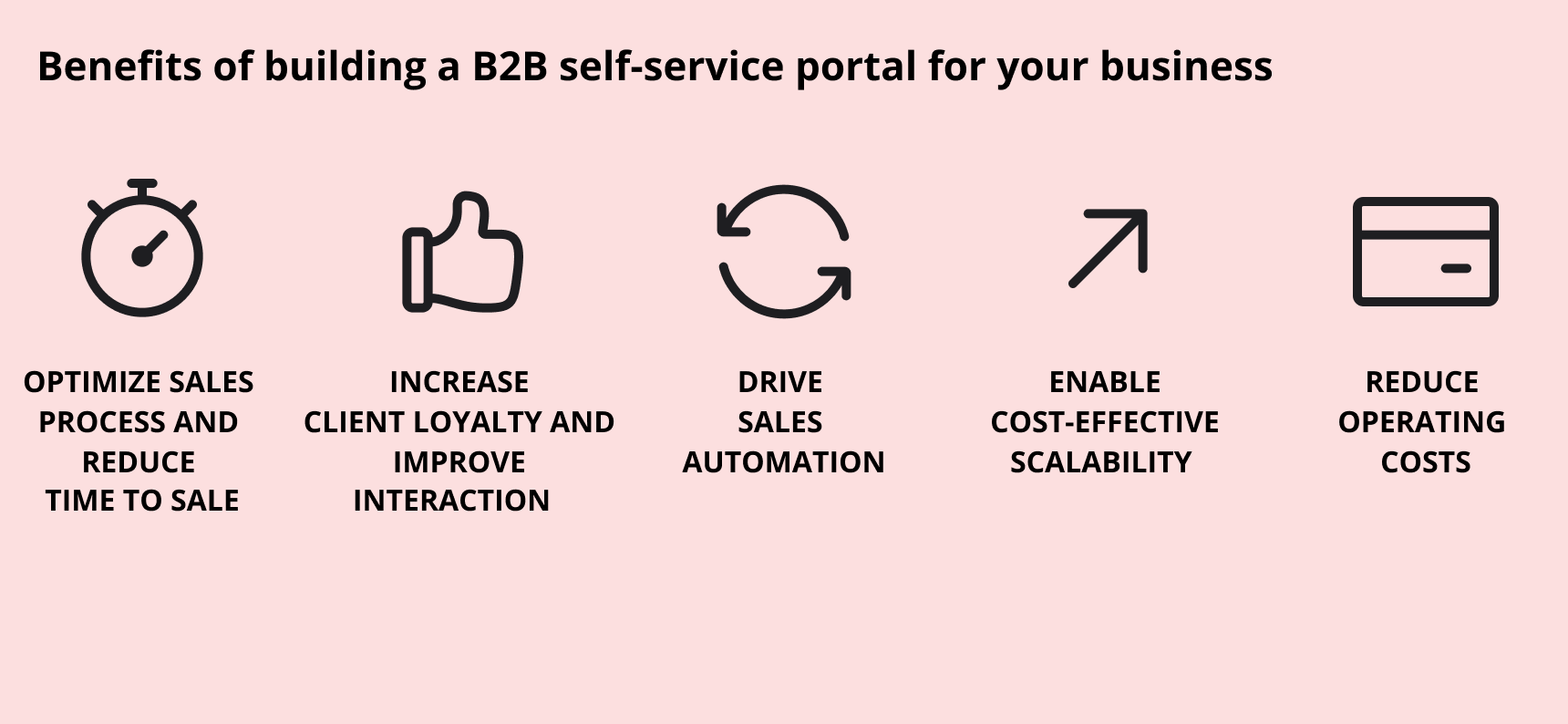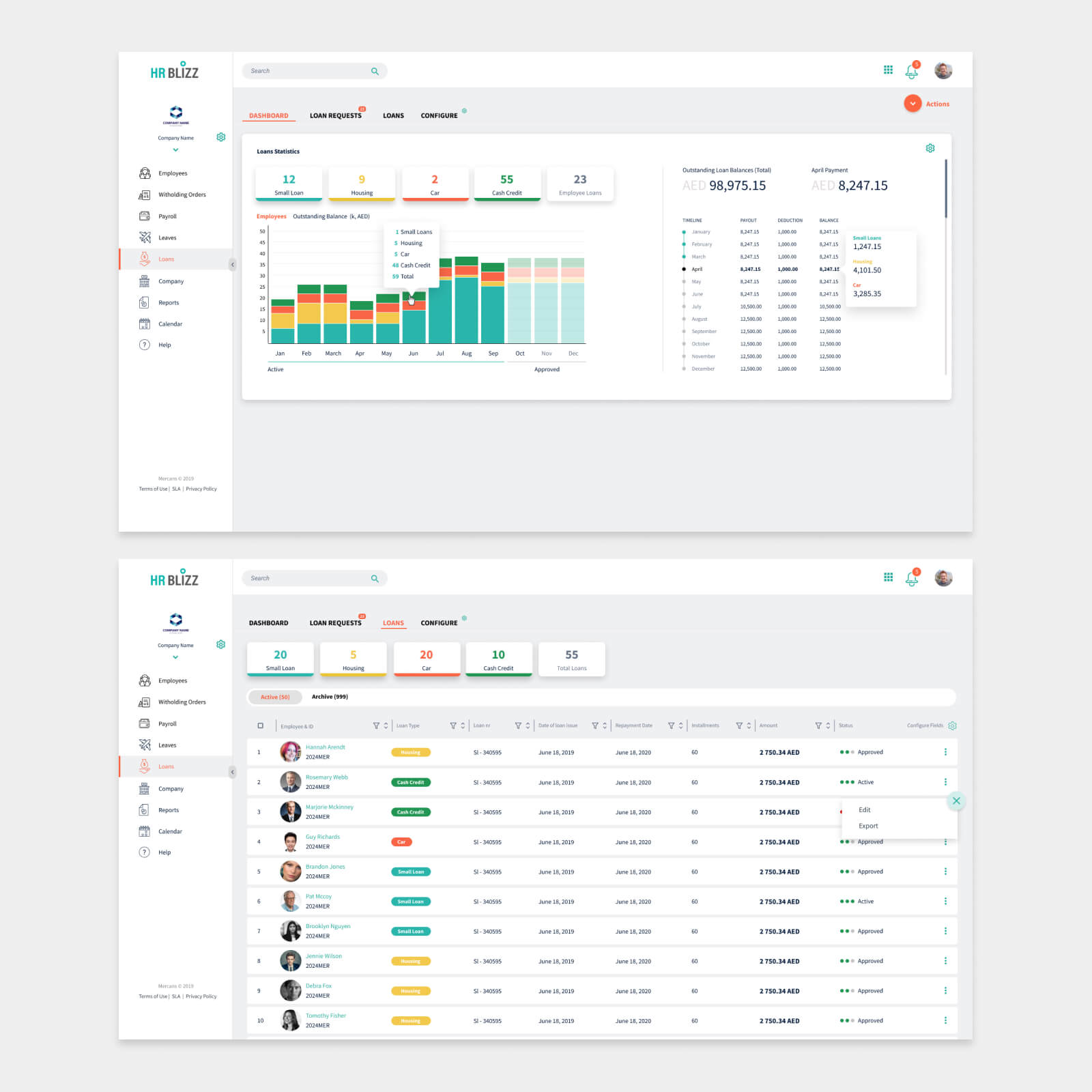B2B Self-Service Portal: Types, Features, and Benefits for Business
According to McKinsey’s recent research, about 80% of B2B decision-makers prefer remote human interactions or self-service when interacting with suppliers. Considering that B2B eCommerce sales on marketplaces in the US alone reached $112 billion in 2022 and continue growing, more and more companies consider the development of B2B self-service portals to keep up with digital trends and ensure customer satisfaction.
This article covers the types, features, and benefits of B2B self-service portals for your business and customers. Read on to see how you can leverage this technology for your profit.
A B2B self-service portal is a user-friendly digital platform where businesses can easily access information, place orders, and get support, making their interactions more efficient and convenient. This solution ensures your B2B customers can find whatever they need themselves.
A B2B self-service portal is designed to enhance the efficiency of business-to-business interactions, reduce administrative overhead, improve communication, and foster stronger partnerships between organizations.
B2B customer self-service portals come in various forms, each catering to specific business needs. Let’s explore these different types and their use cases.

eCommerce portals
eCommerce portals are at the forefront of B2B online sales. They provide a seamless environment for businesses to conduct transactions, manage orders, and monitor inventory. Such platforms are designed to support the high volume of transactions and interactions.
Customer support portals
B2B support portals are an important element to increase customer satisfaction. They serve as a one-stop destination for B2B buyers to seek assistance, access product information, and resolve issues efficiently. Having a customer support web portal for B2B self-services significantly increases convenience and user-friendliness.
Supplier/vendor portals
Supplier or vendor portals are a great tool for business collaboration and B2B service automation process. Having a web portal with B2B self-services for your suppliers can help you save a large amount of time and money. And the benefits only start here.
Financial portals
Financial portals simplify invoicing, payment processing, and financial reporting, making them indispensable for businesses. They often combine the features of e-commerce or supplier portals, as almost all of them integrate payment systems to keep everything in one place.
Other
Apart from these categories, there are also many B2B self-service customer portals tailored to various needs. These include solutions for order management, analytics and reporting, HR and employee management, partner portals and others.
Understanding the functionality of a B2B self-service portal is essential to harness the full power of this technology. These features empower businesses to streamline their operations and provide value to their partners and customers, so let’s look at the most common options.

Accounts, permissions and roles
Corporate accounts are among the most important components of a B2B self-service portal due to the following reasons:
- Personalized experience with customized content and services
- Streamlined transactions with order management and automated payment
- Access to collected data like previous orders, transactions, or interactions
- Enhanced security as the access to all the information is limited to certain accounts
- Centralized management as administrators can control access and permissions for all users
Content management
A B2B self-service portal helps companies enable effective content management with the following tools:
- Content accessibility to all relevant documents, product information, and resources available for all authorized users
- Streamlined transactions with order management and automated payment
- Version control that ensures all users have the most up-to-date information, reducing the risk of errors and confusion
- Collaborative editing and commenting, facilitating teamwork and knowledge sharing among the content management team within the portal
- Categorization and organization that simplifies navigation and search, ensuring users quickly locate specific items within the portal
- Permission management allows administrators to set user permissions, controlling who can access, edit, or delete content to enhance security
Customer support
The capabilities of B2B self-service portals span various customer support functions:
- Knowledge base that provides users with self-help resources, articles, FAQs, tutorials, and documentation, enabling them to find answers to common questions themselves
- Advanced search system that helps users find all the resources that are relevant to their query even when the phrasing isn’t a complete match
- Analytics and reporting that allows the customer support team to identify trends, measure performance, and determine the most frequent issues
- Live chat that provides immediate assistance to users, enhancing customer experience and resolving issues promptly, often using chatbots as an alternative to human interaction
- Multi-channel support that provides users with various communication channels like email, chat, social media, or phone
Communication
The functions of a B2B self-service portal also include effective communication and feedback:
- Messaging system that facilitates real-time communication between businesses, customers, and partners to exchange information or queries
- Notifications and alerts to inform users about important events like order status changes, updates on inquiries, relevant news, and other information to ensure timely and informed decision-making
- Discussion forums or community boards to enable users to engage in discussions, share insights, and seek advice from others, developing a community around your product
- Integration with external channels like social media or email to ensure seamless communication between the portal and other platforms
Automation
One of the strongest elements of a B2B self-service portal is sales automation powered by modern data-driven technologies and AI solutions:
- Customer support automation with intelligent chatbots and robust search recommendation engines
- Order processing automation that includes order creation, invoicing, payment processing, and everything that reduces manual data entry and errors
- Personalized user experience and content delivery that provides tailored recommendations, solutions, and marketing messages to clients based on user behavior analytics, preferences, and historical interactions
- Reporting and analytics that generate insights based on key performance indicators, allowing businesses to make data-driven decisions and monitor the effectiveness of their self-service portal
Automate sales and boost customers satisfaction
Level up your B2B operations and customer experience with powerful self-service tools.
web portal services
Improved customer interaction
Self-service portals help businesses empower their customers giving them an easy access to information, efficient support, and online services. The concept of self-service also ensures that customer inquiries are addressed promptly, as clients can get all the information they need within several clicks.
This results in improved customer interaction, leading to stronger and more loyal customer relationships crucial for long-term business success.
Boosted sales process
Clients can place orders, track deliveries, and make payments with minimal friction within the portal. This streamlined approach eliminates time-consuming manual processes like order entries and verification, resulting in quicker turnaround. Additionally, personalized recommendations can help your clients find what they require even faster.
As a result, your business can potentially increase its revenue generation due to the improved order processing speed and minimized risk of error.
Sales automation
You can automate nearly all sales processes, from lead generation to order processing and beyond. Automation minimizes manual intervention, freeing up your sales teams to focus on strategic activities. You will get rid of paperwork, manual invoices, useless calls, errors, and more.
Incorporating automation into the sales process will ensure consistency and adherence to business rules, automatically applying all the required features.
Simplified scalability
Managing a growing customer base and expanding operations is a great challenge. However, using a B2B self-service portal simplifies scalability by adapting seamlessly to changing demands. You can easily extend the solution both vertically and horizontally as long as you build your web portal with a reliable team.
As you get simplified scalability, your business avoids losing money on extra development services and leverages its maximum client load.
Develop a powerful web portal for your business to attract more customers and grow sales. Digiteum is your reliable tech partner with 14+ years of working in B2B web development and helping companies in retail, logistics, healthcare, and HR integrate self-service capabilities into their operations. Among our leading projects in web portal development are:
- Design and development of a feature-rich web portal for charities to create, customize, monitor, and run donation campaigns among different integrated channels. Since launch in 2022, the portal onboarded dozens of charities, including the Royal British Legion and the British Deaf Association. Read the full story…
- Development of a B2B portal for a UK trend analytics company in collaboration with the client’s in-house team. The solution allows the client’s customers, including brands like Adidas and Starbucks, to access market analytics and trends and get personalized content. We built a range of useful features like user profiles, a web report editor, critical content creation and management functionality, and more. Read the full story…
- UI/UX design and HR portal development for employment management and talent sourcing. The solution optimizes the time and cost-efficiency of operations of the HR and accounting teams, also helping them meet global compliance. Read the full story…

Example: Web portal on an HR platform.
Quick wrap-up
B2B portals are indispensable tools for businesses seeking to thrive and grow their customer base. Their role in enhancing efficiency, improving customer interactions, and driving growth cannot be understated, as most consumers prefer self-service and remote human interactions with suppliers.
If you are looking for a tech partner to help you leverage the benefits of B2B self-service portals for your business, contact our specialists.
Create a better B2B experience
Build a B2B self-service portal that perfectly fits your business process and addresses your customers’ needs.
HIRE PORTAL DEVELOPERS






